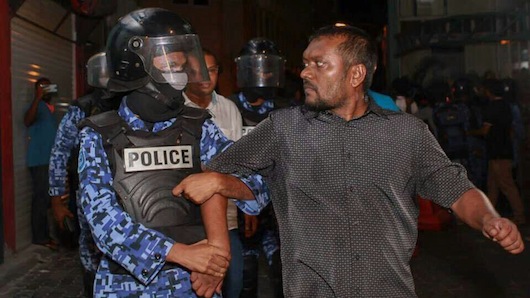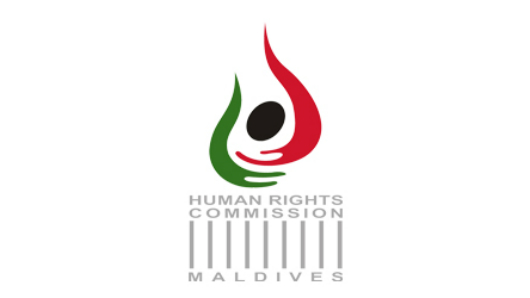The Criminal Court today admitted only two of the 37 defence witnesses requested in former Defence Minister Mohamed Nazim’s weapons possession trial.
Nazim has previously claimed rogue police officers planted a pistol and three bullets found at his apartment during a midnight raid, but the Criminal Court refused to allow the retired colonel to present witnesses, stating they do not appear to negate the prosecution’s charge.
Defence lawyer Ibrahim Shameel pointed to a 2011 Supreme Court precedent in which the apex court said judges had no authority to refuse to hear witnesses.
In reply, presiding Judge Abdul Bari Yoosuf said: “We know what that verdict says. [But] this court has made a decision.”
State prosecutors and defence lawyers are to present concluding statements at the next hearing on Wednesday. Afterwards, the three-judge panel could issue a verdict at their discretion.
The three judges overseeing Nazim’s case, Judge Yoosuf, Judge Abdulla Didi and Judge Sujau Usman, had convicted former President Mohamed Nasheed of terrorism on March 13 and sentenced him to 13 years in jail over the military detention of Criminal Court Chief Judge Abdulla Mohamed in January 2012.
The UN High Commissioner for Human Rights, Zeid Ra’ad Al Hussein and UN Special Rapporteur on Independent of Judges and Lawyers Gabriela Knaul last week called Nasheed’s sentence unfair, contending the Criminal Court’s refusal to call defence witnesses contravened international fair trial standards.
The Criminal Court tonight also refused to allow Nazim to leave the country for urgent medical treatment, noting doctors had said he could attend court hearings despite his condition.
Lawyer Maumoon Hameed in court last week said Nazim’s condition was life-threatening. The former defence minister was subsequently transferred from the Dhoonidhoo Remand Center to house arrest on the doctor’s recommendation.
SWAT officers “gone rogue”
At today’s hearing, the Criminal Court called Superintendent of Police Abdulla Satheeh and Assistant Commissioner of Police Hussein Adam to the witness stand.
Although judges summoned Chief Superintendent of Police Abdul Mannan Yoosuf, they refused to allow the defence team to ask questions over a possible setup against Nazim.
Meanwhile, Adam, who current heads the police’s Internal Security Command and commands the Specialist Operations (SO) officers, told the Criminal Court that Deputy Commissioner of Police Hassan Habeeb asked him to alert the SO’s SWAT team for a major operation, four days before the raid.
Satheeh, who was the chief investigative officer in Nazim’s case, confirmed the raid was carried out under Habeeb’s commands, and said it was the deputy commissioner who had decided not to arrest Nazim at the scene despite the discovery of dangerous weapons.
Satheeh also corroborated testimony by several anonymous police officers last week that the search team had entered Nazim’s apartment after SWAT officers secured the premises.
Nazim’s lawyers previously claimed SWAT officers, after breaking down Nazim’s door and herding his family inside the living room, spent ten minutes inside the then-defence minister’s bedroom unsupervised before the search began.
Adam noted the police would normally request the Maldives National Defense Force (MNDF) to secure premises before a raid to confiscate illegal weapons and explosive devices.
He also said he was unaware the police were raiding Nazim’s home until the next day, and he had raised the issue with the Police Commissioner Hussein Waheed afterwards. But the police chief said some operations must be kept secret, Adam said.
Satheeh, who also heads the police’s Serious and Organized Crime Unit, said he did not notice police having acted against laws and regulations during the investigation.
The search warrant was obtained after police received information from a credible source, Satheeh said. The information did not come through the police’s intelligence directorate, he said, but the police acted on the information because of the reliability of the source.
State prosecutors in court previously said confidential documents on a pen drive confiscated along with the pistol and three bullets indicated Nazim was plotting to attack President Abdulla Yameen, Tourism Minister Adeeb and Waheed, with the financial backing of opposition Jumhooree Party Leader Gasim Ibrahim’s Villa Group.
But Nazim said the SWAT officers framed him on Adeeb’s orders following a fall-out over his complaint with President Yameen regarding Adeeb’s alleged use of the SWAT team to commit crimes, including the chopping down of all of Malé City’s areca palms.
Police have previously dismissed allegations of framing as “untrue” and “baseless.” Adeeb has also said he was “shocked” by the defence team’s “lies.”






